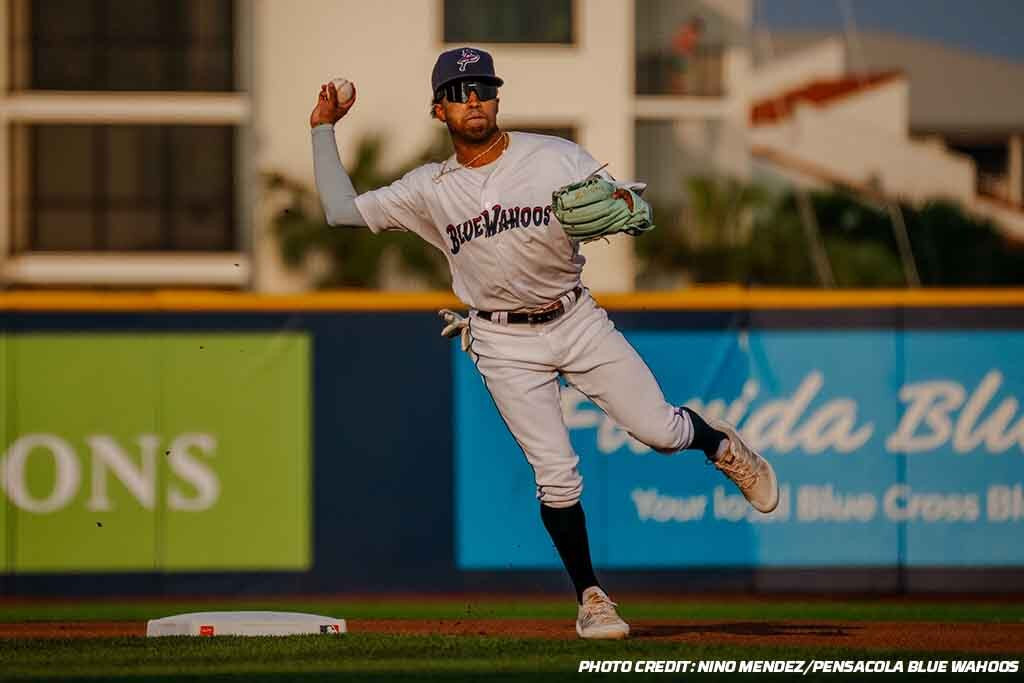Spend a few minutes listening to Nasim Nuñez talk over the phone, and you quickly realize the Nationals’ Rule 5 Draft pick doesn’t fit nicely into a traditional ballplayer persona.
He’s 23 years old, born in the Bronx but raised outside Atlanta, touted as an elite defensive shortstop and baserunner who hasn’t shown a consistent ability to hit as a professional but has shown the plate discipline of a far more experienced and accomplished hitter. Oh, and he was MVP of this summer’s All-Star Futures Game.
He’s clearly confident in himself, but he’s trying not to get too worked up about the opportunity the Nationals have suddenly presented him: To spend the entire 2024 season in the majors after producing an admittedly weak .627 OPS this year for the Marlins’ Double-A affiliate.
“It was bittersweet,” Nuñez said of learning the Nats had taken him in Wednesday’s Rule 5 Draft. “Coming up through the Marlins organization, I created so many bonds with my teammates, the coaches and even the medical staff and everybody else that was there. So it was kind of a wave of emotions, of not wanting to leave but knowing there’s an opportunity out there for me to pursue my dreams.”
This is not a player who should be big-league-ready, at least not as a hitter. But the Nationals were willing to take a shot at Nuñez, rated by one entity as Miami’s No. 6 prospect, believing they can use him enough off the bench as a pinch-runner and defensive replacement to justify keeping him on the roster all season.
“The bat is far behind the defense,” general manager Mike Rizzo said. “But a guy we think has more bat in there. Takes his walks. He’s pretty selective at the plate. … We really try to get as many toolsy players up the middle of the field as possible, and we thought this was a way to get an elite, toolsy player on the roster.”
Rule 5 picks face long odds of making it long-term. Most are sent back to their original organization before completing a full season with their new club. Those that do make it often spend the rest of their career in the minors, trying to find their way back to the big leagues.
That may prove to be Nuñez’s eventual path. But for now, he’s going to believe he can contribute for the Nationals in 2024 and earn the right to stay.
“I’m going to play defense,” he said. “I’m going to have great at-bats. I’m going to get on base. I’m going to score runs. And I’m going to drive in runs. I believe that’s the main purpose of the game and the objective of winning. We have to get on base and score runs, and then we have to stop the other team from scoring runs. Keep it simple.”
Nuñez did do a very nice job of getting on base and scoring runs this season. In 125 games with Double-A Pensacola, he reached base at a .341 clip, thanks in large part to the 87 walks (tied for most in the Southern League) he drew to go along with 110 hits. And he scored 84 runs (third-most in the league).
All this despite an unimpressive .225 batting average and .286 slugging percentage, numbers that explain why the Marlins left him unprotected.
Plate discipline, though, is one of the hardest things in baseball to teach. That Nuñez already excels at it puts him in a rare class of young hitters.
“I believe I have always had it,” he said. “But being younger and at lower levels, you can swing at anything and everything and still hit it, get on base and score. As you get to higher levels, you realize some pitches are just not meant to be hit, so I’m just not going to swing at it.”
Nuñez understands he’s going to have to start hitting more eventually to make it in the majors. He believes he already has the approach to be successful – “Swinging at the right pitch, and being on time” – but must work to get more out of his 5-foot-9, 168-pound body.
Ultimately, the Nationals are presenting Nuñez an opportunity not only to play at the highest level but to learn from a major-league coaching staff and gain the kind of experience most players his age can’t get.
He seems to have a mindset that wants to take full advantage of this opportunity, as evidenced by his answer to a question about how he grows as a ballplayer and as a person.
“Read,” he said. “That’s the only way you get to learn new things without life experience. So I read a little bit. And just continue to learn myself. I feel like every day’s a new day, and there’s something you can learn every day. And once you learn something, now you know it and now you can grow on it.”
